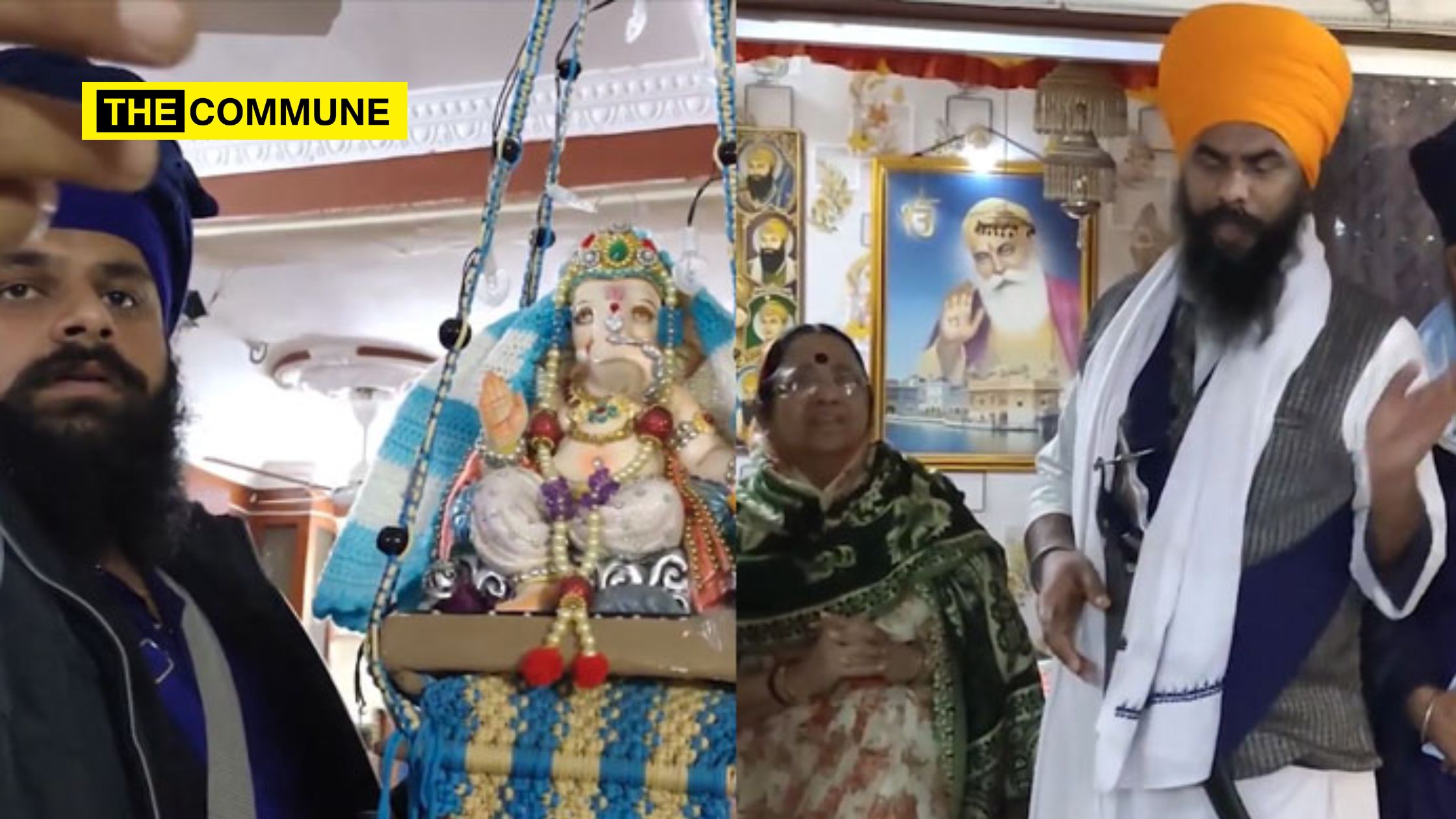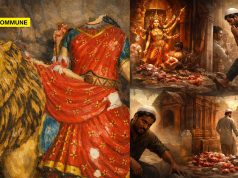
Feature Image Credits: OpIndia
The Hindu Sindhis and the Sikhs have always had cordial, mutually respectful relations based on common roots and culture. While the Sindhis are originally from the Sindh province of pre-partition India, a significant number of Punjabi Sikhs are from the Punjab province of pre-partition India. During India’s Partition, both the Sindhis and the Punjabis lost their ancestral lands. Both communities were deeply impacted by the horrors of Partition and both communities share common roots and traditions. Both communities feel the historic pangs of separation from their ancestral, native lands that were given away to Pakistan.
Both these communities, as well as other Hindu communities, share a painful historic past of centuries of religious persecution under Islamic rule. Sindhis, Punjabi Sikhs and Punjabi Hindus share close and common cultural and religious ties. While the Sikh gurus and their Sikh followers respected and paid obeisance to Hindu gods, gurus and scriptures (including Sri Krishna, Sri Rams and Mother Durga), the Hindu Sindhis respected and paid obeisance to the brave Sikh gurus and their spiritual texts.
But this beautiful, long standing, inter faith, syncretic religious tradition between Sindhi Hindus and the Sikhs, is now under threat with recent reports of several Sindhi Temples in Madhya Pradesh, returning their temples’ copies of the Holy Book of the Sikhs, the Guru Granth Sahib, to the local Gurudwaras (Sikh temples).
Since last week, Sindhi Hindu Temples (Sindhi Tikanas) in Madhya Pradesh, which display and honour the Sikh Holy Book in their temples, have returned close to a hundred copies of the “Shri Guru Granth Sahib” to the local Gurudwaras. The local Sindhi community in Madhya Pradesh says, these unfortunate events are happening on account of what they claim to be a misunderstanding. It had started when some Nihang Sikhs (the revered Akali warrior sect of the Sikh community) alleged that the sanctity of Shri Guru Granth Sahib was not being upheld in the required manner, in the Sindhi Hindu temples, after they were informed of a ‘Mundan’ or hair-cutting ceremony that allegedly took place right outside the ‘Darbar’, where the holy book was placed. The temple administration has denied any intentional wrong doing and has stated that they had not performed a hair-cutting ritual.
https://twitter.com/aashishkumar551/status/1609272065034420225
It appears that the temple authorities were not involved in the ritual which begs the question. Who are the real culprits behind the incident and what kind of mischief is being played, resulting in a religious misunderstanding between the two closely related Indic religions? If such an incident did take place near the space respectfully allotted to the Holy Book in the temple, was it conducted with a malicious intent? The Nihang Sikhs have not accepted the temple administration’s explanation about their non-involvement in the hair-cutting event. Cutting of hair is against the tenets of orthodox Sikhism, likely based on the circumstances under which Sikhism was born, leading to their courageous defence of the native faiths against the tyranny of the fanatic Islamic rulers of the day. “Kesh” or hair is part of the Five Ks (Kesh, Kangha, Kara, Kachera, and Kirpan) in Sikhism. They are considered to be auspicious symbols in Sikhism. It is being reported that the Nihang Sikhs have also expressed displeasure at the placement of Hindu idols next to the Sikh holy book, something they had not fussed about in the past.
Is there a possible link between the spread of extremist views in certain sections of Sikh society under “secular” political parties and the unfortunate disruption of a lovely, religiously-syncretic tradition between the Sikhs and Sindhi Hindus? It is a well known fact that the Islamic Republic of Pakistan has been encouraging and providing covert support to a section of the Sikh community, for the idea of a separate statehood for Sikhs, distinct from the rest of India. Anytime, a “secular” party takes over the political reins in Punjab, the state seems to experience a rise in extremist/separatist activities, fuelled by the “Khalistani” movement, whose top pay masters are reputed to be from the Islamic Republic of Pakistan.
Over the past few months, Punjab has seen an alarming rise in extremist activities, claimed by members of Sikh separatist Khalistani groups. It is not surprising that such activities are happening under a “secular” AAP government. The Khalistani movement was at its peak under the various Congress-led governments at the Centre. The radicalisation of Sikhs, indoctrinated and brainwashed by those who receive training and attractive financial packages from their Pakistani handlers, is worrisome for India, already forced to fight a never-ending Islamist guerilla war, fuelled by the Pakistanis. Vulnerable Sikhs are encouraged to think of their religion as having closer ties to the tenets of Islam rather than the Sikh’s strong and unmistakable roots in Hinduism. A twisted, distorted, perverted version of Sikhism’s history and principles along with a Pakistan-encouraged and financed sikh-statehood narrative, has led to dangerous separatist ideas, among some sections of Sikh society. An increase in incidents of Sikh separatist extremism, is good news for Pakistani Islamists who are playing the old, tried-and-tested card of dividing the Indic, dharmic religions (Hinduism, Buddhism, Sikhism, Jainism, other native, tribal faiths) on the basis of trivial differences.
Sikhism was founded in the 15th century in response to the religious extremism and cruelty of the Muslim rulers of India. The Sikhs fought for themselves and their Hindu brethren. The tradition of respectfully keeping, displaying and honoring a copy of the Sikh holy book- the Shri Guru Granth Sahib, in many Sindhi Hindu temples, is a good example of unity and common cultural roots of all the Indic faiths. A vast majority of Sindhis as well as Punjabi Sikhs and Hindus, had immigrated to India from Pakistan during and after the Partition of the Indian subcontinent. Both Sikhs and Hindus of various communities, chose to immigrate to India out of fear of a Muslim majority Pakistan which had already declared itself an Islamic Republic even as India chose not to adopt Hinduism as a state religion.
It would be a shame if certain Sikh groups now fall prey to the false propaganda spread by Pakistani Islamists. Coincidentally, around the same time that the Sikh separatist ideology/Khalistani movement, is causing incidents of violence in Punjab and Hindu-Sikh ‘misunderstandings’ in India, there appear to be unfortunate incidents of temple vandalism in far away Australia by members of the Khalistani movement.
Let’s hope our Sikh brethren, choose not to disassociate themselves from the true origin of their brave, resilient religion. Let’s hope our Sikh brothers and sisters do not buy into the lies and incitement for a separate statehood, spread by Islamic extremists, who were responsible for countless horrors experienced by both the Sikh and Hindu communities, both of which, share a history of common cultural and spiritual roots. We must continue to stay united, defend and support one another against the onslaught of the common enemy, the fundamentalist Islamic state of Pakistan!
Click here to subscribe to The Commune on Telegram and get the best stories of the day delivered to you personally.




